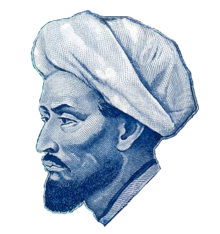
Back الفارابي Arabic الفارابى ARZ Fərabi AZ فارابی AZB Әл-Фараби BA Аль-Фарабі BE Аль-Фарабі BE-X-OLD Фараби Bulgarian আল ফারাবী Bengali/Bangla Al-Farabi BS
| Al-Farabi | ||
|---|---|---|
 Retrato de Al-Farabi | ||
| Información personal | ||
| Nombre completo | Abū Naṣr Muḥammad ibn al-Faraj al-Fārābī | |
| Nombre en persa | ابونصر محمد بن محمد فارابی | |
| Apodo | Segundo Maestro | |
| Nacimiento |
870 Otrar, Kazajistán | |
| Fallecimiento |
diciembre de 950 Damasco, Siria | |
| Nacionalidad | Kazajo | |
| Etnia | Persa o túrquica | |
| Religión | Islam (posiblemente chií)[1] | |
| Lengua materna | Turco | |
| Educación | ||
| Alumno de |
Yuhanna ibn Haylan Abu Bakr ibn al-Sarray | |
| Información profesional | ||
| Ocupación | Filósofo y Polímata | |
| Área | Filosofía de Aristóteles, Matemáticas, Metafísica, filosofía política, filosofía de la educación, epistemología | |
| Obras notables | La ciudad ideal, Catálogo de las ciencias | |
Abū Naṣr Muḥammad ibn al-Faraj al-Fārābī o, en algunas fuentes, Muḥammad ibn Muḥammad ibn Tarjan ibn Uzalag al-Fārābī (en lenguas túrquicas, Farabi, en persa, ابو نصر محمد فارابی), conocido en Occidente con el nombre de Farabius, Al-Farabi, Farabi, Abunaser o Alfarabi, fue un filósofo medieval y polímata centroasiático túrquico.[2][3][4][5][6][7] Nació en Wasil en 872 en el distrito de Farab en el Turquestán Occidental (actual Turkmenistán y antaño Transoxiana) y murió en Damasco, Siria en 950. Estudió todas las ciencias y las artes de su tiempo por lo que se le llamó Maestro Segundo, por referencia a Aristóteles, el Maestro Primero.
Estudió en Bagdad (Irak). A él se debe el comentario de La República de Platón y un Sumario de las Leyes de Platón.
- ↑ Cruz Hernández, Miguel (1995). Presentación en La Ciudad Ideal de Abū Naṣr al-Fārābī. Madrid: Tecnos. pp. XIV. ISBN 9788430926305.
- ↑ B.G. Gafurov, Central Asia:Pre-Historic to Pre-Modern Times, (Shipra Publications, 2005), 124; "Abu Nasr Farabi hailed from around ancient Farabi which was situated on the bank of Syr Daria and was the son of a Turk military commander".
- ↑ Will Durant, The Age of Faith, (Simon and Schuster, 1950), 253.
- ↑ Nicholas Rescher, Al-Farabi's Short Commentary on Aristotle's Prior Analytics, University of Pittsburgh Pre, 1963, p.11, Online Edition.
- ↑ Antony Black, The History of Islamic Political Thought: From the Prophet to the Present, Routledge, p. 61, Online Edition
- ↑ James Hastings, redactor, Encyclopedia of Religion and Ethics, Kessinger Publishing, Vol. 10, p.757, Online Edition
- ↑ Ted Honderich, redactor. (1995). The Oxford Companion to Philosophy. Oxford: Oxford University Press. pp. 269. ISBN 0-19-866132-0 "Of Turki origin, al-Farabi studied under Christian thinkers"
- edited and translated by Norman Calder, Jawid Mojaddedi and Andrew Rippin. (2003). Classical Islam : a sourcebook of religious literature. New York: Routledge. pp. 170. ISBN 0-415-24032-8 "He was of Turkish origin, was born in Turkestan"
- Ian Richard Netton. (1999). Al-Fārābī and His School. Richmond, Surrey: Curzon. ISBN 0-7007-1064-7 "He appears to have been born into a military family of Turkish origin in the village of Wasil, Farab, in Turkestan"
- Henrietta Moore, redactor. (1996). The Future of Anthropological Knowledge. London: Routledge. ISBN 0-415-10786-5 "al-Farabi (873-950), a scholar of Turkish origin."
- Diané Collinson and Robert Wilkinson. (1994). Thirty-Five Oriental Philosophers. London: Routledge. ISBN 0-203-02935-6 "Al-Farabi is thought to be of Turkish origin. His family name suggests that he came from the vicinity of Farab in Transoxiana."
- Fernand Braudel; translated by Richard Mayne. (1995). A History of Civilizations. New York, N.Y.: Penguin. ISBN 0-14-012489-6 "Al-Farabi, born in 870, was of Turkish origin. He lived in Aleppo and died in 950 in Damascus"
- Jaroslav Krejčí ; assisted by Anna Krejčová. (1990). Before the European Challenge: the great civilizations of Asia and the Middle East. Albany: State University of New York Press. pp. 140. ISBN 0-7914-0168-5 "the Transoxanian Turk al-Farabi (d. circa 950)"
- Hamid Naseem. (2001). Muslim Philosophy Science and Mysticism. New Delhi: Sarup & Sons. pp. 78. ISBN 81-7625-230-1 "Al-Farabi, the first Turkish philosopher"
- Clifford Sawhney. The World's Greatest Seers and Philosophers, 2005, p. 41
- Zainal Abidin Ahmad. Negara utama (Madinatuʾl fadilah) Teori kenegaraan dari sardjana Islam al Farabi. 1964, p. 19
- Haroon Khan Sherwani. Studies in Muslim Political Thought and Administration. 1945, p. 63
- Ian Richard Netton. Al-Farabi and His School, 1999, p. 5